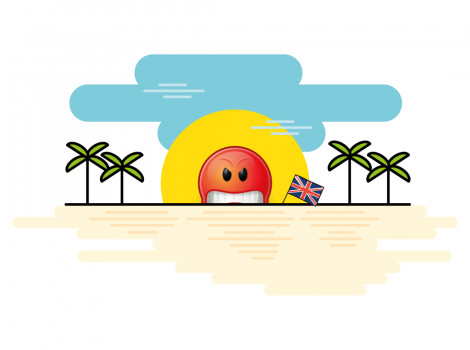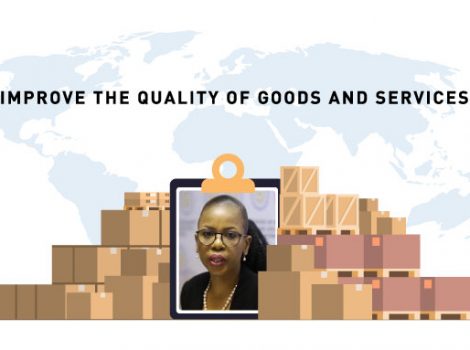
Back in 2020, we posted an article entitled ‘Bad Business Practises That Haunt Botswana’s Business Space’, written on the back of Peggy Serame (who was then the Minister of Investment, Trade and Industry) urging local producers to improve the quality of their goods and services, to give them a competitive edge in the domestic, regional and international markets. Our previous article highlighted some areas where we feel businesses in Botswana could improve. Like most of our articles, this continuation is based on more experiences and observations.
President Masisi has travelled to various countries, shaking hands with various leaders, trying to open doors to new business opportunities and new trade avenues. The government has also engaged various foreign agencies to work alongside ministries in establishing policies and trade deals with countries in other continents. This is great, but we cannot forge new business relationships externally and ignore how business is conducted internally. How business is conducted in Botswana is NOT how business is conducted elsewhere in the world.
I’m not solely referring to dubious practices and corruption, which quite frankly happens in Botswana and everywhere else in the world. I’m referring to the basics. Business is all about relationships, the better the relationship the better the business. But it’s not just the connection between the seller and a buyer, it’s also the connection customers have with a brand. It is said your brand is what people say about you when you’re not in the room, well, business in the 21st century often starts when you’re not in the room… or in the same country. Business will often start with your reputation, your website, an email or a phone call.
Since our last article, there has been one notable event that took place earlier this year – Forbes Under 30 Summit, which was hosted in Gaborone and Kasane. This was an opportunity to showcase Botswana’s potential, as the event featured many of Botswana’s young business men and women. But the organisers may have left slightly disheartened, as it shined a light on certain deficiencies.
Forbes 30 is a very serious platform, which most of us do understand, will not understand. When you talk Forbes you are talking big money, high standards and apologetic ministers. The Forbes office was met with an apology of sorts that went something like ‘those lofty standards cannot work here. We are pleading with Forbes to lower their threshold otherwise we are likely to get a Forbes 0 under 30 situation’. – Thulaganyo Jankey (The Monitor)
This was the first-ever Forbes Under 30 Summit Africa, bringing together entrepreneurs from more than 40 countries. The fact Forbes was asked to ‘lower their threshold’ is quite embarrassing. Forbes 30’s ‘lofty’ standards meant Botswana struggled to find enough ‘entrepreneurs’ under the age of 30. If memory serves me right, even the people over the age of 30 failed to meet certain criteria, such as the lack of companies with websites.
Website
The need for a website is rapidly becoming a minimum requirement for businesses. The best way to put yourself in the global space is to have a website, although many Batswana businesses prefer social media platforms as a substitute for a website. Yes, social media accounts are free, but don’t disregard or underestimate the value of a website. Much of my business comes via my website, many of those who find me are pleased by the fact I have a website. There are lots of business opportunities outside of Botswana, but how do you expect any opportunities to find you if you don’t have a website?
Poor Quality Websites
Admittedly, there are some companies and organisations with websites, but the overall standard is very poor. Many are dated and look as though they were constructed at the start of the millennium. Even those that have been constructed using WordPress themes can look awful. Having an unattractive or dated website is just as bad as not having a website.
Websites need maintaining and very few organisations keep their content up-to-date. For example, I see organisations that haven’t uploaded annual reports since 2017. This gives the impression the organisation hasn’t updated their website in years. Stop being lazy!
There are many agencies and individuals in Botswana who create websites, unfortunately many of them are responsible for the shoddy websites I’ve seen. I’ve worked with a local web design agency, and it’s not an experience I want to have again. It’s not easy getting a website created, but global business works both ways. You can find a web designer anywhere in the world and a good, professional designer will make the process as painless as possible.
Social Media
While there are some benefits to using Facebook, overall, I don’t believe it is the best option in the long-term. Social media platforms are predominantly a marketing tool for advertising and promotions. But Facebook isn’t cheap, especially for small businesses. To adequately promote your business you need deep pockets. You’ll need to invest in producing regular innovative and dynamic content, but even then, I’m not sure you’ll see a substantial return.
I don’t believe many people use Facebook in the same way they did a few years ago. The platform has changed (not in a good way), and their algorithms are irritating. I’m not convinced people take much notice of actual content, I believe many people react to certain posts on autopilot. It’s a bit like being handed a flyer from someone in the street; we take it out of politeness, but moments after, we throw it in the bin.
I also think many people who do use social media to sell can be extremely lazy about how they go about it. Real estate for example, some of the pictures posted of properties are just horrible. Another fine example of Facebook practise is people not listing prices, telling users to either ‘inbox’ or ‘app’ for price. I have no idea why people think this is a good strategy. Of course, there’s also the worry the price will change depending on the sellers perception of how much they think you can afford, based on a quick review of your profile. This practise isn’t confined to Facebook, but it is a practise that breeds distrust.
The other problem with social media is authenticity. So many people use filters and staged photoshoots for the purpose of deceiving their audience. Who or what can you trust on social media anymore? If someone is selling what seems to be too good to be true, it most likely is. If social media is your chosen platform, I would suggest relying less on Facebook and trying another platform – Twitter, LinkedIn, Tumblr, Pinterest – but not as a substitute for a website.
Don’t elevate yourself
One thing I see more and more, especially on LinkedIn, is people calling themselves ‘experts’ and ‘specialists’. On what do these people base this self-proclaimed title? An ‘expert’ is a person who is very knowledgeable or skilful in a particular area and is likely to have many, many years of experience. If you’re in your 20s or 30s, then I doubt you tick all of those boxes. I’ve been working in my profession for close to 20 years and I don’t consider myself an expert. Yes, be confident, but remain humble, it’s for others to decide if they consider you an expert or not.
Celebrity
Make a decision, do you want to run a business or do you want to be a celebrity? Business is a two-way relationship, and if anyone is the ‘celebrity’, it’s your customers. If I’m selling a rotten apple, who I’m friends with, where I live, where I went to school, or my social media or societal status doesn’t change the fact I’m selling a rotten apple. Your reputation is more important than your perceived popularity or number of followers, so focus on the quality and delivery of whatever it is you do.
Chasing fame means you are placing yourself above your brand. Don’t think you are bigger than your brand. Including yourself on your marketing material is nothing more than indulgent, and no-one likes working with an ego. It’s also a poor strategy if you have more than one business, as you only serve to dilute your brands. It’s also risky. On the one hand, business successes will be attributed to you, but on the other hand, any business failures will also be attributed to you.
Gmail et al
While people will find every excuse to justify using a gmail account as their primary business email, most professionals across the world advise against it. Yes it’s free, but you are also more susceptible to increased spam, viruses, data storage issues as well as data protection issues. Should anything go wrong with your gmail, who do you call? If your account goes down, you could lose everything. Taking the technical aspect aside, it’s just not professional; using a Gmail account might hurt how your clients see you professionally. It ultimately questions the legitimacy of your business.
Invest, invest, invest
Many businesses can lack adequate funds in the beginning, but many do actually receive funding, yet still try to start a business with as little investment as possible. Even when they start to make money, they still don’t invest. One area in particular that suffers is their brand identity and branding collateral. If the foundation of your business is built on ‘cheap’ then don’t expect to attract quality. Invest in your brand, invest in a website, invest in your products or services.
Treat customers as you want to be treated
Be honest, be kind and deliver. Some of the best leads you can ever get are from referrals and word of mouth. No one likes poor service or buying below par products, so why provide poor services or sell naff products. If you expect the best, then be prepared to provide the best. Sometimes you have to make sacrifices to do what’s right in order to achieve the goal. The customer is king (within reason) because without customers you don’t have a business.
Reputation
I’ve worked with people and agencies from across the globe with links to Botswana. Sadly, they have very few positive experiences or positive opinions about business in Botswana. Recently, I was even communicating with someone in the Middle-East and he was aware of Botswana’s poor reputation. I was shocked, and it’s embarrassing. I also worry because it could deter people away from my business.
It’s very difficult to get rid of a bad reputation, and Botswana is known for a somewhat lethargic approach to business. It’s obvious there are a lot of people here who don’t like work, but here’s the thing… most people in the world don’t like work. The difference is other people realise its their source of income and work is an unavoidable part of life. So choose to make lemonade with the crappy lemons because it’s the only fruit that grows on the tree of life.
Based on my own experiences, I do not enjoy business in Botswana. It doesn’t matter who it is, what I’m doing or what organisation, the experience is seldomly satisfying or without unnecessary challenges. The balance is one-sided, instead of it being a mutually beneficial engagement, you feel as though you have to do most of the work for a positive outcome, and almost everything revolves around money. Yet business is not just about money.
Business is global and the Botswana market is small and limited, seeking business from outside is not an option, but rather a necessity. Botswana businesses cannot relax and think overseas customers will accept or adapt to Botswana’s style of business. Across the globe, there are different cultures and different business practises, but honesty, integrity, transparency and great delivery will always shine through. This builds your reputation and in turn, adds to your credibility. How you conduct yourself, how you present yourself and how you are perceived will make either increase or minimise your opportunities.
Starting a business is difficult, running a business is difficult, but conducting business should not be as difficult as it is in Botswana. Modern advancements are leaving Botswana behind and certainly, where business is concerned, the world will not make any exceptions nor wait for Botswana to catch up. The only constant is change.




Geoff.
Very informative thank you. This also helps me update my business plan